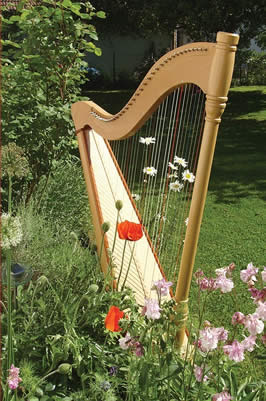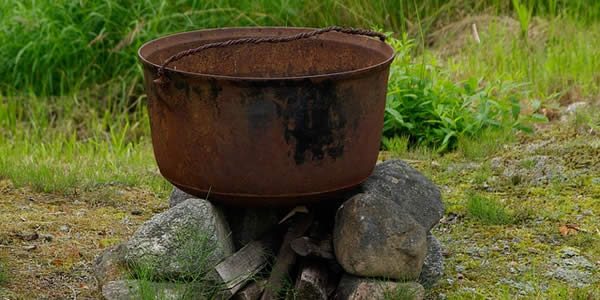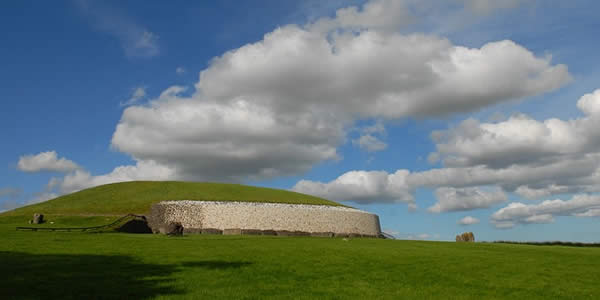The “All Father” is a figure found in many Pantheons. From Zeus to Odin, from Ra to Yahweh, father gods play an important role in mythology. These gods share similar attributes. They are usually an elder member of the gods, if not the oldest of them all. Often, these gods can give or take life, control the weather, provide supreme wisdom, or perform miracles.
The Irish Dagda, the father god of the Tuatha Dé Danaan, is no exception. Known for his many abilities, the Dagda is aptly named Eochaid Ollathair, meaning “Great Father” or “All Father.” Some of his most famous legends are part of the Mythological Cycle, one of four major periods of Irish mythology. In Cath Maige Tuired , or “The Battle of Maigh Tuiredh,” we are told he was bestowed with the name the Dagda, meaning “the Good God.” This name is a testament to his vast skill-set which revolves around various types of creation and destruction.

The Dagda is considered to be extremely powerful. He carries an enormous club that could give life with one end and take it with the other. He owns a harp, Uaithne, that could control the emotions and behavior of men by playing a song of sorrow, one of laughter, or one of joy.
Abundance, agriculture, and fertility are also associated with him. The Dagda has a pair of ever-laden fruit trees and his harp can control the seasons. His cauldron, known as the Undry or the Cauldron of Plenty, can provide infinite food and drink. The cauldron also serves as a tool to provide rebirth and regeneration.
The Dagda shares many traits with the common man and woman, making him extremely repeatable. These shared similarities make him an excellent elder god and keep him relevant in modern society.
Through myth and meditation, there is much to learn from him. Some of the lessons I have learned include:
Acceptance of the Physical
Modern society has a tendency to encourage us to contemplate our bodies in extremes. We are simultaneously instructed to be critical of our physical selves and also to ignore our physicality in pursuit of inner beauty. We are constantly receiving mixed messages. Are we to be accepting of ourselves or be constantly trying to transform?
Lately, it seems society demands perfection on everything from our physical looks to our sexual histories. Recently, at least two Olympic athletes were publicly body shamed. Our children are committing suicide as a result of bullying and millions of people suffer from eating disorders.
Some of us face judgement based on our sexual activity or preferences. Half the time we are told to accept ourselves and the other half we are being shunned by our communities. For many of us, these extreme messages about food and sex have resulted in a disconnect from our true physical selves.
The Dagda acknowledges that physical sensations-taste, sound, sex-are a gift. He does not place the physical beneath the mental or spiritual levels. He understands that physical desires are a normal and natural part of life. He does not feel guilty taking care of his requirements and he unashamedly satisfies his urges. In doing so, the Dagda reminds me to celebrate my physical self and take care of my physical needs.
Now, I’m not advocating acting in the extremes. The Dagda had quite an appetite for both food and sex. He found himself in many predicaments when he overindulged. These myths teach that it is best to stay within the lines of moderation.
The Importance of Hospitality

The Dagda’s most known symbol is the Cauldron of Plenty, one of the four great treasures of Ireland. This cauldron supplied unending sustenance to any company.
Throughout history, hospitality has been an important part of Irish life. There were even rules that governed how host and guest should interact. A host must provide hospitality and a guest must not refuse it. It would be extremely offensive if either party failed to do their part.
In many tales, the Dagda finds himself bound by the laws of hospitality and he never fails to oblige. The Dagda reminds me to be generous, act selflessly, and honor my commitments.
Don’t Take Myself Too Seriously
Some myths describe the Dagda as looking quite comical, often after he has acted in excess. He is depicted as being of unusual size, walking in an oafish manner, and wearing a shirt that barely covers his bottom.
However, he has a sense of humor in his interactions with others. In one famous tale, the Fomorians–rivals of the Tuatha Dé Danaan–try to trick the Dagda. They make him a mammoth pot of porridge made with grotesque ingredients like live goats. Bound by the laws of hospitality, the Dagda must eat it or risk offending them. He slurps down the entire bowl of porridge with a gigantic spoon described as big enough for a man and woman to lie inside. Once finished, the Dagda finds his belly to be as large as a whale’s. This shames him not one bit and he promptly attempts to sleep with the daughter of his enemy.
The humorous depiction of the Dagda makes him stand out among other gods in mythology. Despite occasionally appearing oafish or crude, the Dagda has prowess, power, and wits.. Though the Dagda is a mighty figure his imperfections make him very relatable to humans.
For these reasons, the Dagda reminds me to not take myself too seriously. A moment of embarrassment will have zero impact on my capabilities. Life should be celebrated and that is hard to do when you can’t laugh at yourself.

Use My Wits & Be Resilient
The Dagda is seen in many myths negotiating with other parties. Using his intellect, the Dagda artfully maneuvers situations into his favor. He exudes confidence. Though he doesn’t always come out on top, he seems to always get back up.
His strength and resilience may be why the Dagda is associated with oak trees, a sacred tree to the Druids. The Oak is associated with endurance. The Dagda reminds me to be clever in my interactions and learn from mistakes. Should I fail, I’ll be wiser the second time around.
Bottom line: I can always reach out to the Dagda if I need a boost of confidence, a reminder to love my body, or a little sense of humor.
How do you relate to him or other father gods? What significance do father guides play in your practice? Leave a comment to share your insight.

Patheos Pagan on Facebook.

the Agora on Facebook
Cauldron, Sword, Spear, & Stone is published twice monthly on alternate Saturdays. Subscribe by RSS or e-mail.
Please use the links to the right to keep on top of activities here on the Agora as well as across the entire Patheos Pagan channel.

















